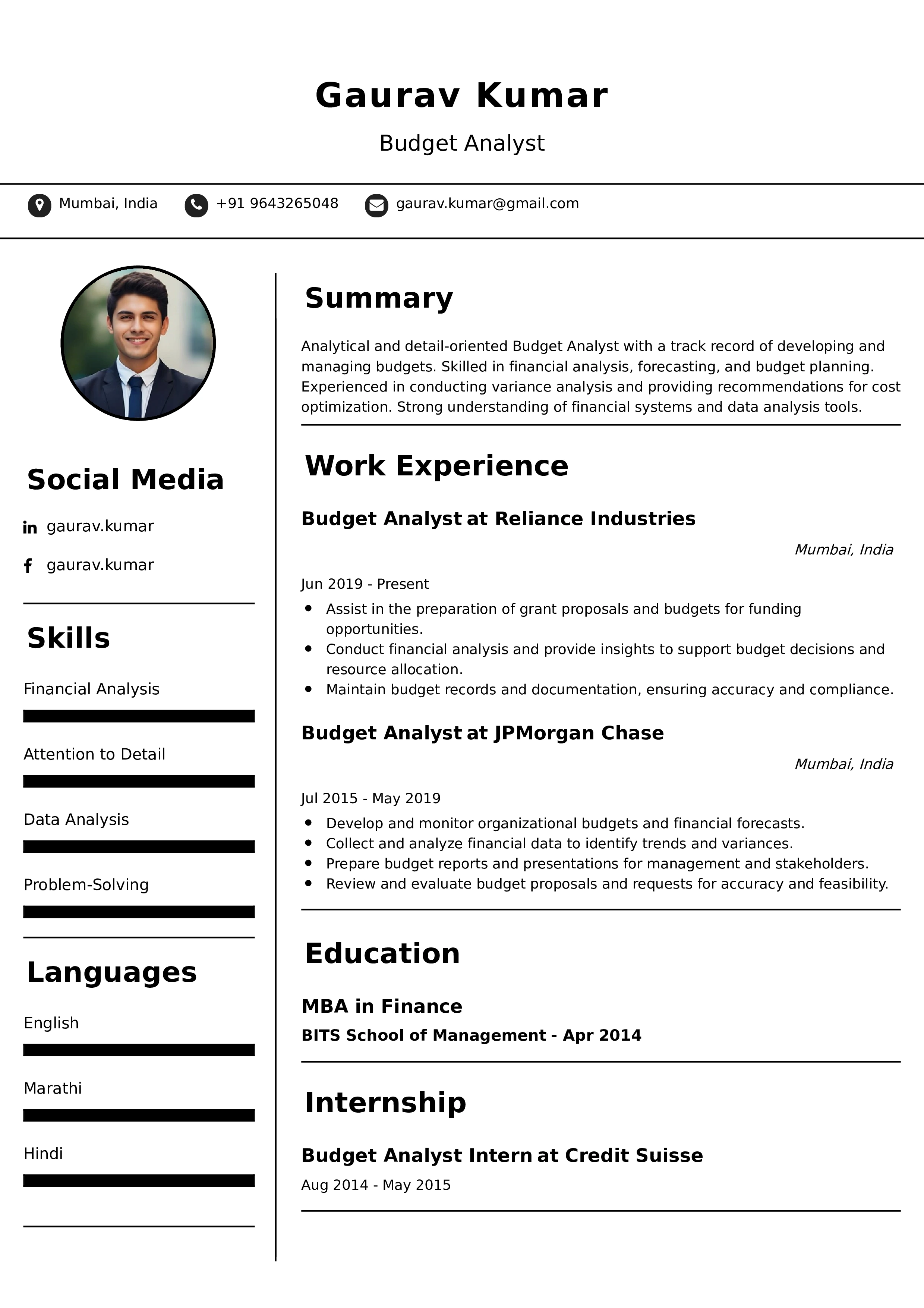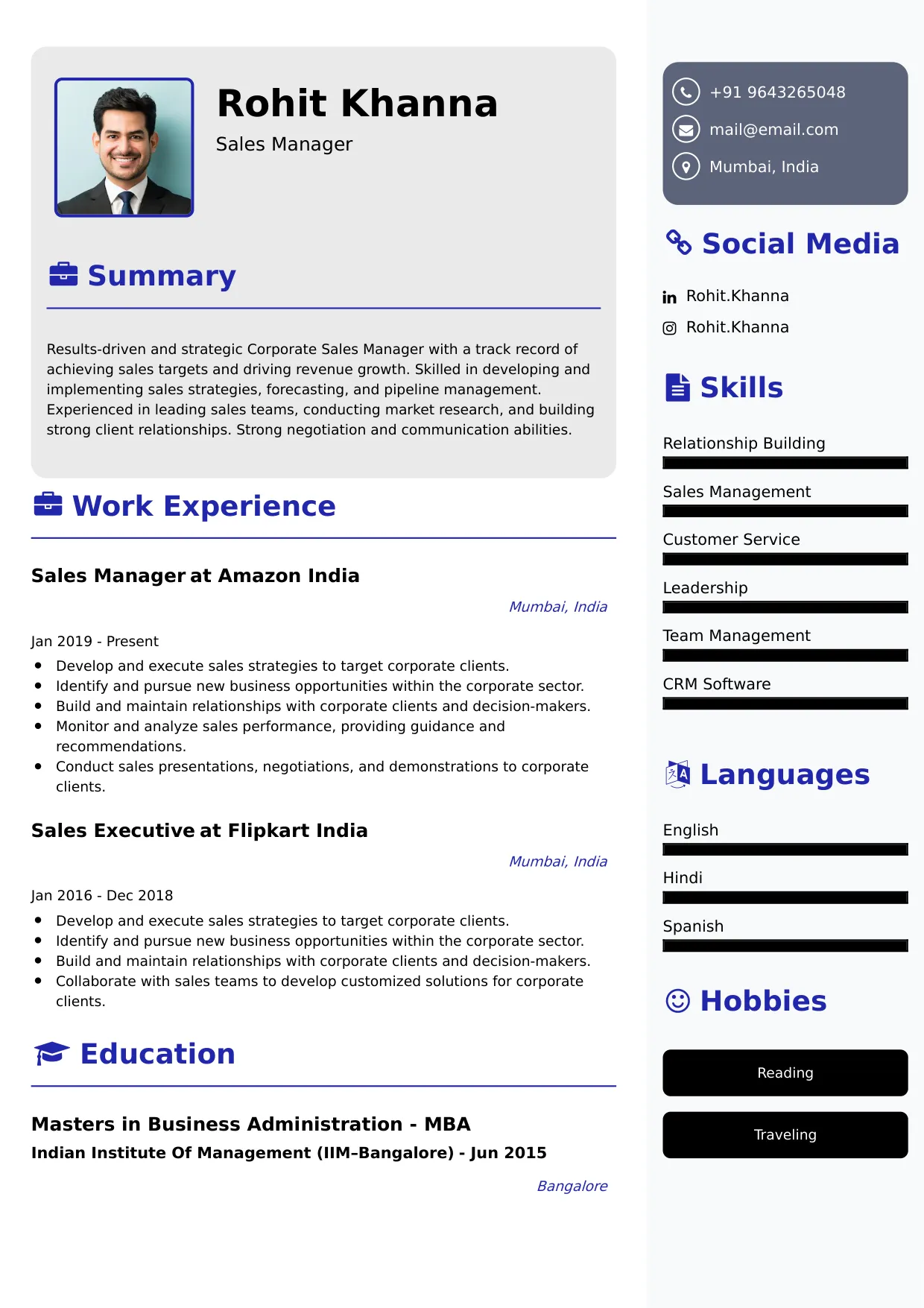Budget Analyst
Welcome to our Budget Analyst resume sample page! This expertly crafted resume template is designed to showcase your expertise in financial planning, budget forecasting, and data analysis in the finance industry. Whether you're an entry-level candidate or a seasoned professional, this sample highlights key skills like budget management, cost analysis, and financial reporting, tailored to meet top employers’ demands. Use this guide to create a compelling resume that stands out and secures your next career opportunity.

Superbresume.com empowers Budget Analysts to craft resumes that highlight their financial planning and analytical expertise. Our platform offers customizable templates tailored for finance roles, emphasizing skills like budget forecasting, cost analysis, and financial reporting. With ATS-optimized formats, expert-written content suggestions, and real-time resume analysis, we ensure your resume aligns with job descriptions. Showcase your experience in optimizing budgets, reducing costs, or preparing financial reports with confidence. Whether you’re an entry-level analyst or a senior professional, Superbresume.com helps you create a polished, results-driven resume that grabs hiring managers’ attention and lands interviews.
How to Write a Resume for a Budget Analyst
Craft a Targeted Summary: Write a 2–3 sentence summary highlighting your budget analysis experience, forecasting skills, and financial accuracy, tailored to the job.
Use Reverse-Chronological Format: List recent finance roles first, focusing on budget management or cost analysis.
Highlight Certifications: Include credentials like CFA or CPBA to boost credibility.
Quantify Achievements: Use metrics, e.g., “Reduced budget overspending by 15%,” to show impact.
Incorporate Keywords: Use terms like “budget forecasting,” “cost analysis,” or “financial reporting” from job descriptions for ATS.
Detail Technical Skills: List tools like Excel, SAP, or Tableau in a skills section.
Showcase Projects: Highlight initiatives like budget optimization or financial audits with outcomes.
Emphasize Soft Skills: Include attention to detail and problem-solving, demonstrated through financial tasks.
Keep It Concise: Limit your resume to 1–2 pages, focusing on relevant finance experience.
Proofread Thoroughly: Eliminate typos or jargon for a professional document.
Focus on Financial Software: Employers prioritize proficiency in tools like SAP or Oracle, as 65% of roles require software skills in 2025.
Data-Driven Budgeting: Highlight expertise in using analytics tools like Tableau for forecasting.
Cost Optimization: Showcase reducing operational costs, a key trend in budget analysis.
Zero-Based Budgeting: Emphasize experience with zero-based budgeting techniques, reflecting industry shifts.
Regulatory Compliance: Include adherence to financial regulations like GAAP or SOX.
Metrics-Driven Achievements: Use results like “optimized budget allocation by 20%” to show impact.
Cross-Department Collaboration: Highlight working with departments to align budgets, critical for 60% of roles.
Predictive Analytics: Include using predictive models for budget forecasting, a growing focus.
20 Key Skills for a Budget Analyst Resume
| Budget Forecasting | Cost Analysis |
| Financial Reporting | Excel |
| SAP | Tableau |
| Zero-Based Budgeting | GAAP Compliance |
| SOX Compliance | Data Analysis |
| Budget Management | Financial Modeling |
| Predictive Analytics | Variance Analysis |
| ERP Systems | Cost Optimization |
| Cross-Department Collaboration | Data Reporting |
| Attention to Detail | Problem-Solving |
10 Do’s for a Budget Analyst Resume
- Tailor Your Resume: Customize for each budget analyst job using job description keywords.
- Highlight Certifications: List credentials like CFA prominently.
- Quantify Achievements: Include metrics, e.g., “Reduced overspending by 15%.”
- Use Action Verbs: Start bullet points with verbs like “forecasted,” “analyzed,” or “optimized.”
- Showcase Projects: Detail initiatives like budget optimization with outcomes.
- Include Soft Skills: Highlight attention to detail or problem-solving through financial examples.
- Optimize for ATS: Use standard section titles and avoid complex formatting.
- Keep It Professional: Use a clean, consistent font and layout.
- Add a Portfolio Link: Include a link to a portfolio with budget analysis case studies.
- Proofread Carefully: Ensure no typos or errors for professionalism.
10 Don’ts for a Budget Analyst Resume
- Don’t Overload with Jargon: Avoid excessive financial terms that confuse recruiters.
- Don’t Exceed Two Pages: Keep your resume concise, focusing on relevant experience.
- Don’t Omit Dates: Include employment dates for career context.
- Don’t Use Generic Templates: Tailor your resume to budget analyst roles.
- Don’t List Irrelevant Skills: Focus on budget-specific skills like forecasting, not unrelated ones.
- Don’t Skip Metrics: Quantify results wherever possible.
- Don’t Use Complex Formats: Avoid ATS-unreadable graphics.
- Don’t Ignore Soft Skills: Include attention to detail and problem-solving examples.
- Don’t Include Outdated Experience: Omit jobs over 15 years old unless relevant.
- Don’t Forget to Update: Refresh for trends like predictive analytics or zero-based budgeting.
5 FAQs for a Budget Analyst Resume
Prioritize budget forecasting, cost analysis, and financial reporting. Include certifications like CFA.
Use standard section titles, avoid graphics, and include keywords like “budget forecasting” or “cost analysis.”
Yes, a portfolio with budget analysis case studies can set you apart.
Detail project scope, tools used (e.g., Tableau), and outcomes like reduced costs.
Use a reverse-chronological format to emphasize recent financial achievements.
Get 5x more interviews with our crafted Resumes. We make resumes that land jobs.

Get a Free Customized Cover Letter with Resume Expert Advice
with every resume order placed, you will get a free Customized Cover letter.
